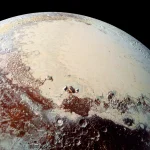Dinosaurs and other forms of megafauna ruled the Earth for more than 160 million years. They stomped, soared, and swam all across the planet. But about 65 or 66 million years ago, something happened. Suddenly, almost all the dinosaurs were gone. So, what caused this giant, world-changing extinction? Was it a single disaster, or a combination of events? Let’s dig into the evidence and discover what scientists think really happened!
The Mysterious Disappearance
For a long time, nobody knew exactly why the dinosaurs vanished. Fossils showed they suddenly disappeared from the Earth’s layers of rock, but clues to the cause were harder to find. Scientists call this event the Cretaceous-Paleogene extinction, or K–Pg extinction for short. Whatever happened, it wiped out about 75% of all living species – including most dinosaurs.
The Asteroid Impact Theory
The most famous explanation is the asteroid impact theory. Scientists believe that a huge space rock – about 6 to 9 miles wide – came crashing down near what is now Mexico’s Yucatán Peninsula. The impact created a giant crater, called the Chicxulub crater, which is still visible today (if you know where to look!).
This asteroid hit Earth with unimaginable force, releasing energy like billions of nuclear bombs. The explosion sent dust, ash, and rock into the sky, blocking out sunlight. This sudden “global winter” made Earth much colder and darker for months or even years. Without enough sunlight, plants couldn’t grow, and plant-eating animals began to die. Meat-eating dinosaurs soon followed.
Volcanoes and Other Factors
But was it just the asteroid? Some scientists think massive volcanic eruptions in what is now India – called the Deccan Traps – also played a big role. These volcanoes poured out lava and gas for thousands of years, filling the air with ash and poisonous chemicals. This could have already been making life tough for dinosaurs even before the asteroid struck.
There are also ideas about changing sea levels, shifting climates, and even diseases affecting plants and animals at the time. It’s possible that a combination of disasters, not just one, led to the dinosaurs’ extinction.
Not All Was Lost
While dinosaurs disappeared, some creatures survived. Birds, for example, are actually modern-day dinosaurs! Many small mammals, amphibians, and reptiles also made it through the disaster, paving the way for new kinds of life – including, eventually, humans.
The extinction of the dinosaurs changed the history of life on Earth. It ended one amazing chapter, but it made space for a whole new world to develop.
Fascinating Facts About Dinosaur Extinction
-
The asteroid impact was fast: Scientists think the actual collision and first wave of destruction happened in just hours to days.
-
Evidence in the rocks: All over the world, there’s a thin layer of clay rich in a rare metal called iridium (which comes from asteroids) right at the time the dinosaurs vanished.
-
Firestorms: The impact caused wildfires that swept across the continents.
-
Giant waves: Tsunamis hundreds of feet high crashed onto distant shores.
-
Survivors: While non-bird dinosaurs went extinct, birds and many small animals survived and evolved.
Questions to Ponder
-
Why do you think some animals survived the extinction event while others didn’t?
-
How did the extinction of the dinosaurs make room for mammals, and eventually humans, to thrive?
-
What clues do you think scientists look for to figure out what happened so long ago?
-
How might Earth’s history have been different if the asteroid had missed our planet?
-
What lessons can we learn from past extinctions about protecting life on Earth today?
The story of the dinosaurs’ extinction is a tale of sudden disaster, tough survivors, and the power of change. It reminds us that Earth is always evolving… and that there are still mysteries to explore, both in the rocks beneath our feet and in the stars above!


